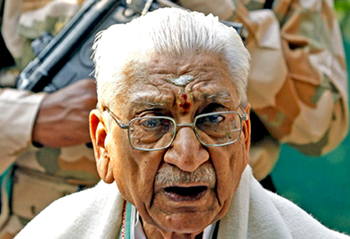Bengaluru, Jun 8: Amid the relaxations in the coronavirus-induced lockdown, wedding planners are adapting to changing times and advancing themselves to provide best possible services to their clients.
Wedding planners come up with new trends. While women are matching their masks to their outfits, men who use turban for a wedding are wearing matching masks with the turbans. People are getting creative at the same time maintaining safety protocols. The live streaming of weddings for those who could not attend the wedding is also becoming a new normal.
Manisha Porwal Chouraria, a wedding planner at Color Palette Productions speaking to news agency said that Post COVID-19, weddings are performed as per the old cultures.
"Wedding Industry has impacted due to lockdown in the wake of COVID-19. Now, the concept of micro-wedding is trending in which you have guests who are close to you. Now, the old culture is back again as people who use to hold a wedding at lavish destinations are getting married in their lawns, farmhouses, terraces. Earlier, people used to get married in their 'Aangan' (Courtyard), people seem to be doing the same now. It is more personalised and expenses have come down, now. People are spending small amounts on decoration," said Chouraria.
"Following government guidelines, we are allowing 50 people at the wedding and not more than that. We are doing live streaming telecast and people can watch the wedding. We are also shipping gift boxes with a letter to 500 people who could not become part of the wedding. In the letter, we are writing that because of norms, you may not be invited but we want something to gift you on our wedding. People are planning to get married now and decide to throw a grand reception after 6 months in the hope that things will get better," she added.
Commenting upon how wedding planners are ensuring social distancing and how the fashion style changed due to pandemic, Chouraria said: "People are using matching masks. If women are wearing silk sarees, they are also wearing silk masks. Men are wearing matching masks with saafa (turban). The entire staff is asked to wear PPE kits. We are giving the guests a healthy kit comprising up of masks, sanitisers, gloves and tissues. We are doing thermal screening of the guests. We are also gifting cuddle curtains, a plastic transparent shield by using which you can touch feet of elders without physically touching them."
Mansi Porwal, Creative Head at Color Palette Productions said that it is becoming a challenging task for creative heads to plan wedding but still they are providing their best to the clients.
"Earlier people used to do theme wedding, big Indian Fat weddings. Now people are wedding with a small gathering. Now, family members are getting time to suggest the wedding planners about themes and the thing they want in their weddings. We are providing the best," she said.
"We have come up with a new theme, 'Har Din Subh hai' which means every day is auspicious. Post COVID-19 people are looking for available dates for the wedding. Now, every day becomes auspicious. This is going to be the new trend," she added.
Another wedding planner, Abhilash of Taarini Weddings said that their company is providing customised masks to guests.
"Earlier we have lots of weddings to cover across the globe. But now, we have less numbers of weddings. Budgets are reduced now. We are happy to start again. We are creating e-invites in which we are sending the guidelines to the guests. We also have a help desk to assist the clients and guests. We are providing the matching masks to the groom and we are also giving customized masks to guests too," he said.
Earlier, Karnataka's Department of Health and Family Welfare Services had issued an advisory for marriages, stating that not more than 50 guests shall be allowed and the consumption of liquor on the occasion will be prohibited.
As per the advisory, anyone found having fever, cold, cough, difficulty in breathing shall not be permitted to attend the event and immediately referred to seek medical advice.
"All persons shall wear face mask compulsorily. All persons shall maintain a physical distance of more than one metre. Hand wash with soap and water shall be provided in washrooms," adds the advisory.





Comments
I quite like reading through an article that will make people
think. Also, many thanks for allowing me to comment!
Here is my webpage :: how to save your relationship: http://www.sfsc8.cn/comment/html/index.php?page=1&id=21061
Add new comment